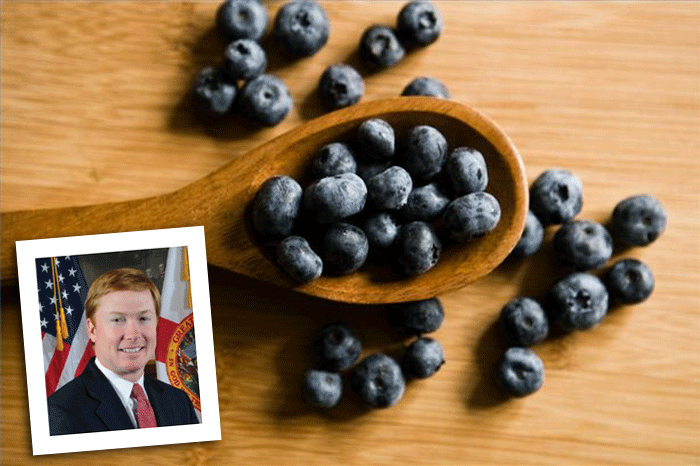WHILE MANY OTHER industries have suffered during difficult economic times, Florida agriculture remains one of the strongest pillars in the state’s economy and continues to grow. During the last year, Florida agriculture grew by $150 million in cash receipts, creating an additional 5,000 jobs for Floridians and generating $20 million in tax revenues.
The strength of Florida agriculture is due, in part, to research and innovation, which enable Florida farmers to grow more, better-tasting and longer-lasting crops using fewer resources. The Florida blueberry is one commodity that has contributed to the growth of Florida’s agriculture industry as a result of research and innovation.
Since 1977, Dr. Paul Lyrene of the University of Florida has developed and patented more than 23 named varieties of blueberries, which have many desirable characteristics for Florida farmers. Lyrene’s blueberry varieties are disease-resistant and yield more, better-tasting fruit. Most importantly, his varieties don’t require exposure to much cold weather in order to flower and fruit, meaning they can be successfully grown in Florida’s warmer climate. With the addition of early-ripening characteristics, his varieties are harvested at a time of year when they can’t be grown anywhere else in the country.
As a result of Dr. Lyrene’s contributions, Florida’s blueberry industry has grown from just a few hundred acres to more than 4,000 acres over the last 30 years. With promotional support by the Florida Department of Agriculture and Consumer Services, Florida blueberry cash receipts have grown from less than $500,000 in the 1980s to more than $48 million in 2010. Each year, Florida blueberries account for 1,700 jobs, $7 million in indirect tax contributions, and $120 million in total economic impact.
Looking forward, the department is exploring opportunities to expand this valuable crop to new markets, including South Korea, Japan, Singapore, United Kingdom, and Sweden. In addition, major efforts to develop and market blueberry wine – a growing industry itself – are ongoing.
However, we are not only focused on expanding the international market for Florida blueberries, but also identifying potential markets within our communities. I assumed responsibility of the state’s school nutrition programs in January and have been working to serve more locally grown fresh produce, including Florida blueberries, in school cafeterias. Connecting Florida growers with Florida schools is a win-win for our state: Florida students will be eating more of this nutritious commodity and Florida blueberry growers are finding new markets for their produce.
This promising commodity will contribute to the dynamic future of Florida agriculture, and we look forward to continuing to work with our blueberry growers to ensure Florida blueberries remain a thriving industry rather than the niche market of yesteryears.
CREDIT
column by COMMISSIONER ADAM H. PUTNAM
Adam H. Putnam is commissioner of the Florida Department of Agriculture and Consumer Services.

